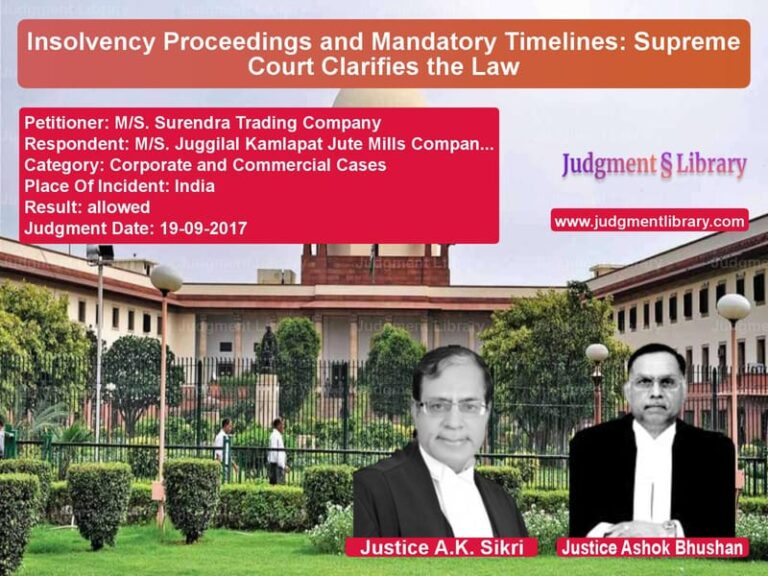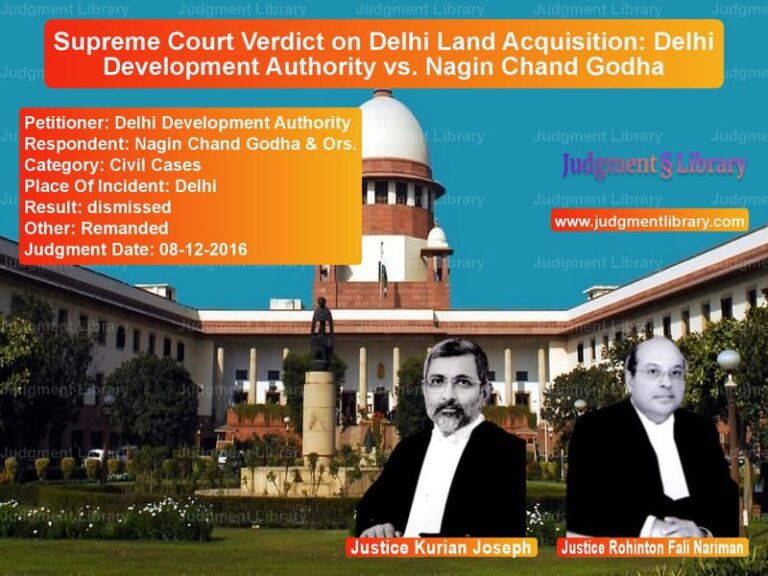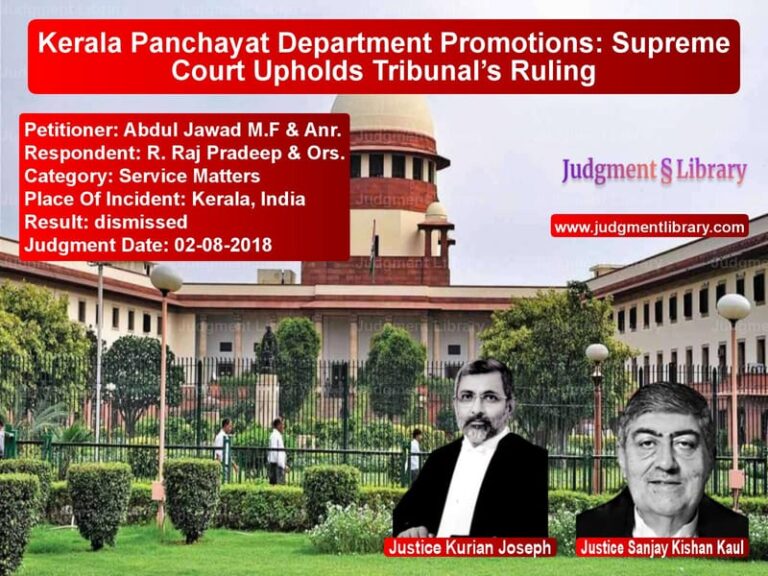Supreme Court Rules on Agricultural Land Dispute in Haryana
The Supreme Court recently ruled on a dispute over agricultural land ownership and tenancy rights in Haryana, addressing critical issues of sub-tenancy and counterclaims under the Code of Civil Procedure (CPC). The case involved an appeal against a Punjab & Haryana High Court ruling concerning ownership, tenancy, and possession of disputed land in the village of Gagarwas, Tehsil Loharu, District Bhiwani.
Background of the Case
The case originated when the plaintiffs (Saroj and others) filed a suit seeking declaration and possession of agricultural land measuring 80 Kanals and 19 Marlas. They claimed ownership and alleged that defendant No.2, Ishwar Singh, was a tenant who had unlawfully sublet the land to his son, defendant No.1, Satyender, without their consent. They demanded eviction and possession of the land.
The defendants refuted these claims. Defendant No.1 denied any involvement in cultivating the land, arguing that the sub-tenancy entry in revenue records was incorrect. Defendant No.2 asserted that the land had been in possession of his family for generations, and that he and his two brothers had jointly inherited tenancy rights after their father, Ganpat Rai, passed away.
The trial court ruled against the plaintiffs, holding that they failed to prove their ownership and the alleged sub-tenancy. The first appellate court upheld this decision. However, the Punjab & Haryana High Court, in a second appeal, partially overturned the lower court rulings, granting ownership rights to the plaintiffs over two plots (Killa Nos. 21//3/2 and 7//13) while rejecting the counterclaim of the defendants over Killa Nos. 6//18 and 23.
Arguments Before the Supreme Court
Petitioners’ Arguments (Satyender & Ors.)
- The appellants contended that the High Court erred by not formulating a substantial question of law before deciding the case, which is a mandatory requirement under Section 100 of the CPC.
- They argued that the plaintiffs failed to prove ownership and sub-tenancy, and the lower courts correctly dismissed the claims.
- The appellants claimed that the High Court wrongly rejected their counterclaim for Killa Nos. 6//18 and 23, asserting that they had lawful possession over those plots.
Respondents’ Arguments (Saroj & Ors.)
- The plaintiffs maintained that the tenancy rights of the defendants had ended and that they were entitled to possession of the land.
- They supported the High Court’s ruling that awarded them ownership of two plots, arguing that the defendants had failed to present any counterclaim over those specific plots.
- They argued that the counterclaim raised by the defendants over Killa Nos. 6//18 and 23 was unrelated to the main suit and should be dismissed.
Supreme Court’s Observations
The Supreme Court addressed two key legal issues: whether a substantial question of law was required for the second appeal and whether the High Court correctly ruled on the ownership and counterclaim issues.
Read also: https://judgmentlibrary.com/supreme-court-modifies-refund-order-in-nagpur-real-estate-dispute/
On the first issue, the Court clarified that in Haryana, second appeals are governed by Section 41 of the Punjab Courts Act, 1918, rather than Section 100 of the CPC. The Court referred to its Constitution Bench ruling in Pankajakshi & Ors. v. Chandrika & Ors. and subsequent cases affirming that second appeals in Punjab and Haryana need not be based on a substantial question of law.
“In the State of Haryana, a court in second appeal is not required to formulate a substantial question of law, as what is applicable in Haryana is Section 41 of the Punjab Courts Act, 1918 and not Section 100 of CPC.”
On the issue of land ownership, the Supreme Court held that the High Court’s decision to grant ownership to the plaintiffs for Killa Nos. 21//3/2 and 7//13 was incorrect, as the burden of proof lay on the plaintiffs, and they had failed to establish their claim before the lower courts.
“Plaintiffs have to prove their case on the strength of their evidence. The High Court erred in granting them ownership merely because the defendants did not claim those plots.”
Regarding the counterclaim over Killa Nos. 6//18 and 23, the Supreme Court upheld the High Court’s ruling, citing Order VIII, Rule 6A of the CPC, which states that a counterclaim must be connected to the plaintiff’s claim. The defendants’ counterclaim was unrelated and thus invalid.
“A counterclaim can only be set up against the plaintiff’s claim. Since there was no claim by the plaintiffs on Killa Nos. 6//18 and 23, the defendants were barred from raising a counterclaim on these plots.”
Supreme Court’s Verdict
The Supreme Court ruled as follows:
- The High Court’s order granting ownership of Killa Nos. 21//3/2 and 7//13 to the plaintiffs was set aside.
- The High Court’s dismissal of the defendants’ counterclaim over Killa Nos. 6//18 and 23 was upheld.
- The trial court and first appellate court’s findings that the plaintiffs failed to prove sub-tenancy were affirmed.
The judgment reinstated the trial court’s ruling, rejecting the plaintiffs’ claims and ensuring that only valid counterclaims could be entertained under the CPC.
Impact of the Judgment
This ruling has significant implications for property disputes and procedural law:
- It clarifies that second appeals in Haryana do not require a substantial question of law under the CPC.
- It reinforces the principle that plaintiffs must prove ownership claims with substantial evidence.
- It upholds the limitations on counterclaims, ensuring they must be directly related to the plaintiff’s claims.
The judgment provides legal clarity for agricultural tenancy disputes, ensuring that procedural rules are strictly adhered to in second appeals and counterclaims.
Petitioner Name: Satyender & Ors..Respondent Name: Saroj & Ors..Judgment By: Justice Uday Umesh Lalit, Justice S. Ravindra Bhat, Justice Sudhanshu Dhulia.Place Of Incident: Bhiwani, Haryana.Judgment Date: 17-08-2022.
Don’t miss out on the full details! Download the complete judgment in PDF format below and gain valuable insights instantly!
Download Judgment: satyender-&-ors.-vs-saroj-&-ors.-supreme-court-of-india-judgment-dated-17-08-2022.pdf
Directly Download Judgment: Directly download this Judgment
See all petitions in Property Disputes
See all petitions in Landlord-Tenant Disputes
See all petitions in Judgment by Uday Umesh Lalit
See all petitions in Judgment by S Ravindra Bhat
See all petitions in Judgment by Sudhanshu Dhulia
See all petitions in partially allowed
See all petitions in Modified
See all petitions in supreme court of India judgments August 2022
See all petitions in 2022 judgments
See all posts in Civil Cases Category
See all allowed petitions in Civil Cases Category
See all Dismissed petitions in Civil Cases Category
See all partially allowed petitions in Civil Cases Category







